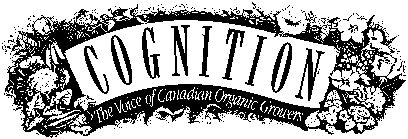

Cognition Index | Virtual Library
| Magazine Rack
Search
| Join the Ecological Solutions Roundtable
Gleanings:
Regulating Pesticidesby Ann Cleary
Yolanda Henry of Nepean, Ontario, an experienced campaigner against pesticides, will be COG National’s new representative on the Ecological Pest Management Standing Caucus of the Canadian Environmental Network (CEN).
In response to the government's "Proposal for a Pest Management Regulatory System" dated October, 1994, the present working caucus, with the addition of delegates from other environmental groups of note (including the chairperson of COAB), submitted a report to the government by the deadline Nov. 30/94.
The complete caucus submission can be obtained by calling the CEN at (613) 563-2078. Important recommendations in the submission include the following:
• The pest management system must include an alternatives program that meaningfully fosters a reduced dependency on addiction to pesticides through the redesign of agricultural and forestry systems.
• Qualified health and environmental professionals must be hired to oversee the registration process.
• The full cost of registering pesticides in Canada must be borne by industry. Public funds should only be directed at ecological alternatives to pest control products.
• The public must have access to industry data on products before registration is approved to ensure a transparent and accountable system that protects health, safety, wellbeing and environment.
• The criteria to be used for pesticide registration must be developed in consultation with public, non-governmental, environmental, health, and labor groups.
• No part of the new registration system can be based on cost/benefit or risk/value balancing. If a product poses unacceptable risk to human or animal health or to the environment, it must be removed from the system regardless of its value.
• Products disallowed or deregistered in Canada must not be exported to other countries.
CEN wants individuals and groups to send letters endorsing any or all of above points to Sheila Copps, Minister of the Environment, House of Commons, Ottawa ON K1A OH3 (postage free) with a copy to CEN, Ecological Pest Management Caucus, Box 1289, Station B, Ottawa K1P 5R3, fax (613) 563-7236, Attention Craig Boljkavac. Faxes or letters must be sent by January 31.
Novel Foods
Three federal departments – Agriculture & Agrifood, Health and Environment – sponsored a workshop November 8-10, 1993, in Ottawa. Over 250 participants drawn from a wide spectrum of organizations concerned with biotechnology discussed issues pertinent to the regulation of biotechnology from environment, consumer, producer, research and industry perspectives, with recommendations on risk assessment, animal health, food safety and modified (through genetic engineering) products. The proceedings, "Regulating Agricultural Products of Biotech-nology", should still be available from these departments, from your M.P. or from Shari Haas (613) 952-8000.
A year later, on November 24 and 25, 1994, Audrey Baran and I were among 40 participants who attended another workshop in Ottawa on "Labelling of Novel Foods Derived through Genetic Engineering". The purpose of the workshop was to develop fundamental principles for the government to consider in formulating policy, guidelines or regulations for labelling novel foods. Three working groups hammered out principles under direction. Those common to all were the "right to know" which necessitates some form of labelling, and "freedom of choice" which means there must be alternatives from which to choose.
The words traditional and organic were suggested, but many thought three categories were needed: organic, which would indicate no use of pesticides or chemical fertilizers; traditional, for what we now know as conventional farming methods but with no use of genetically engineered products; and no labelling at all for products that have been genetically engineered. Symbols could be used to indicate the differences. Real problems arose with combined foods, restaurant meals and so on.
The deliberations will undoubtedly be published in due course, but whether they will have any real impact on the final decisions remains to be seen. However, we were given a very nice novel-foods-free lunch!
Copyright © 1995.
Ann Cleary.Reprinted with permission. All rights reserved.
Info Request | Services | Become EAP Member | Site Map
Give us your comments about the EAP site
Ecological Agriculture Projects, McGill University (Macdonald
Campus)
Ste-Anne-de-Bellevue, QC, H9X 3V9 Canada
Telephone:
(514)-398-7771
Fax:
(514)-398-7621
Email: info@eap.mcgill.ca
To report problems or otherwise comment on the structure of this site, send mail to the Webmaster